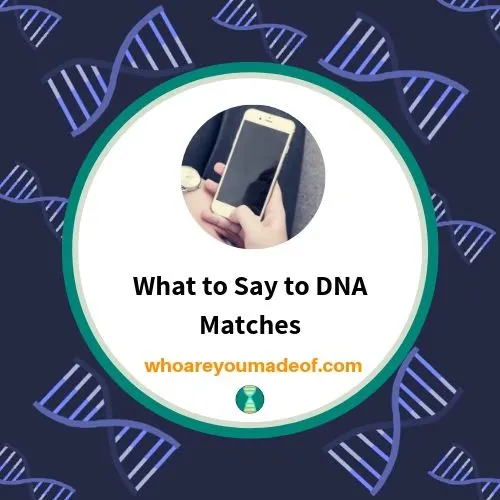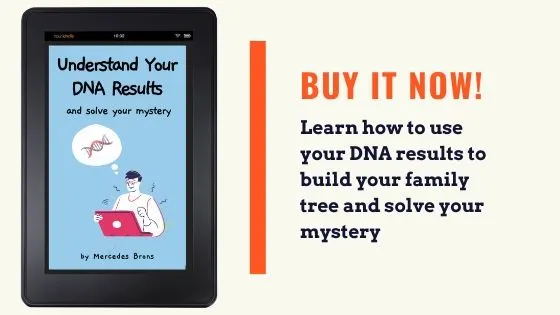Are you wondering what to say to DNA matches? In this post, I'll discuss different ways to approach your DNA matches and what you might say depending on your unique circumstances.
Every person chooses to do a DNA test for a slightly different reason than the next. For example, some individuals are interested in proving or disproving family lore or searching for a specific biological relative.

When you consider contacting your DNA relatives, the approach you will take depends greatly on what you would like to learn from your DNA match and whether you are interested in developing a long-term family relationship with them.
The ideas expressed in this post are only suggestions. You know your family (and your own personal style!) much better than I do, and so you should follow your instincts when it comes to contacting your matches.
Before we get started, are you still on the fence about contacting your newly-discovered genetic relatives? Check out this post:
What to say to DNA matches if you are interested in genealogy
If you are interested in family tree research and want to contact your matches to find out what they know about the family tree, this part of the article will help you figure out which information to include and how to form your message.
If you are interested in genealogy, I hope that you have already started building a family tree on Ancestry. It's the best way to keep track of the information that you learn, and you can provide a link to your tree in any e-mail or message that you send to your matches.
Before you decide to contact a DNA match to learn more about your family tree, you should do some basic legwork to try to figure out which line of your family tree your match shares with you.
If you need some guidance as to how to do this, take a look at this post to get some ideas to help you figure out how you might be related to your match:
Now that you have a family tree (even a small one) and know how you might be related to your match, you are ready to form your message. Your polite and well-formatted message should include the following details:
- Your first name
- Why you are contacting them (i.e. "I'm working on my family tree)
- Your estimated relationship from your DNA match profile, or your exact relationship based on your family tree research
- The surname or surname (or specific ancestor) that you are researching
- A specific question that they might be able to answer
- As a bonus, you could include a bit of information about your shared family line that they might find interesting
If you include all of the information above, you will establish trust and open a mutually beneficial line of communication with your match.
Pro tip: If you get a reply from your DNA match, don't forget to follow up or reply!
Example of a message to a DNA match if you are interested in genealogy:
The following is a message that I might send to a DNA match. I have already built a family tree, and I will have already tried to work out how we might be connected.
Hello, Robert,
My name is Mercedes and I saw you on my DNA match list. Based on what I know about our family tree, I believe that we are second cousins twice-removed.
I've been working on our shared ancestor, Sam Perkins (born in 1869). I'm descended from his daughter, Sarah, who was your great-grandfather's sister.
I saw that you have a family tree attached to your DNA profile, and you referenced a family bible. Would your family bible happen to have any photographs or information about Sarah?
I would be happy to share a link to my family tree and any information that you think might help you with your research.
Looking forward to hearing back from you,
Mercedes
What to say to DNA matches if you are looking for biological family connections
If you are searching for biological family members or would like to establish a long-term relationship with your DNA match, your approach will probably be a bit different than if you are only interested in exchanging genealogical information.
It's okay if you aren't interested in having contact with DNA matches. Not everyone jumps into DNA testing wanting to get in touch with complete strangers - it's understandable!
Those of us who do want to make contact with DNA matches who are relatively closely related to us (i.e. close than third cousins) will find that our messages are best received when they contain the following information:
- Full name (first and last)
- Exactly how you are related (if known) or the relationship possibilities based on the amount of DNA you share
- Your complete line of descent from the common ancestor (if known - see example below), since this is especially important for close matches
- An offer to share what you have learned about your family with them
- End the message by expressing that you hope to hear back and/or keep in touch (as you feel is appropriate)
Any additional information that you choose to share is up to you. For example, if you were adopted or if you don't know much about your family, you don't have to mention it in your original communication.
Sometimes, it's best to start simply and see how your DNA match responds to your messages.
Example of a message to a close relative DNA match:
Dear Sarah,
My name is Mercedes and I saw your name on my DNA match list. According to the amount of DNA we share, we are estimated to be first cousins.
This is so amazing!
Based on our shared DNA matches, I certain that we are related through my maternal grandfather, George Washington.
George Washington had four children, and one of them was my mother, Martha.
I am very interested in learning more about our connection, and I would be happy to share family information with you.
I'm excited to hear back from you,
Mercedes
What should you say to distant DNA matches?
A distant cousin match, for the purposes of this article, is someone with whom you share less than 20 centimorgans of DNA.
It's very difficult to estimate how closely (or how distantly) we might be related to someone if we only share a very small amount of DNA. For this reason, I rarely contact my distant cousins.
If I tried to figure out how all of my distant cousins were related to me, I think it might make me crazy! Not everyone has a family tree going back the 8-10 generations that we might need to find the connection.
The two best reasons to contact a distant DNA match?
- If you think you aren't really distant cousins (it's possible to share very small amounts, or even no DNA, with a second cousin once-removed)
- You are researching a specific ancestor that both you and your distant cousin share
If you are contacting your distant cousin for either of these two reasons, you can reference the previous sections in this post to determine the best way to approach making contact.
Conclusion
I hope that this post has helped you get some ideas about how to approach your DNA matches and what you might say to them.
If you have any questions about something that you read in this post, or if you have a question about contacting a match, I would encourage you to join us in the discussion below.
Thanks for stopping by today!

